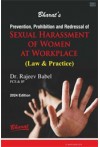
- Author(s): Rajeev Babel
- Publisher: Bharat Law House
- Edition: 1 Ed 2024
- ISBN 13 9789394163942
- Approx. Pages 560 + Contents
- Format Paperback
- Approx. Product Size 24 x 16 cms
- Delivery Time 3-5 working days (within Kerala & South India) (Others 7-9 days)
- Shipping Charge Extra (see Shopping Cart)
......................................................................................................................................
Description
Violence against women is perhaps the most shameful human rights violation, and it is perhaps the most pervasive. It owns no boundaries of geography, culture or wealth. As long as it continues, the Nation cannot claim to be making real progress towards equality, development and peace. While gender violence is as old as humanity, it is only in the past two decades that it has been publicly recognized, systematically structured and legislated against to a significant degree. In 1990s such violence was finally admitted on international level with recognition of human rights issue. Internationally, the World Conference on Human Rights (1993) at Vienna, which was one of the main turning points in women's right, declared that human rights of women and of the girl child are inalienable, integral and indivisible part of universal human rights. The Vienna Declaration specifically condemned gender- based violence and forms of sexual harassment and exploitation. Article 11 of the Convention on Elimination of All Forms of Discrimination (CEDAW), to which India is a party, requires State to take all appropriate measures to eliminate discrimination against women in the field of employment. Article 14 of the Constitution of India provides equity before law whereas Article 15 prohibits the discrimination on grounds of religions, race, caste, sex, or place of birth. Sub-clause (3) of Article 15 also gives power to the State for making any special provisions for women and children. Article 19(1)(g) gives the fundamental right to all citizens to practise any profession, or to carry on any occupation, trade or business. This right pre-supposes the availability of an enabling environment for women, which is ubiquitous, safe and secure in every aspect. Article 21, which relates to the right to life and personal liberty, includes the right to live with dignity, and in the case of women, it means that they must be treated with due respect, decency and dignity at the workplace. With growing awareness and importance of girl education, more and more women are showing their inclination towards work culture and coming out form their home for being financially independent.
......................................................................................................................................
Table of Contents
Chapter 1 Introduction and Rational behind enactment of POSH Act
Chapter 2 Preliminary
Chapter 3 Constitution of Internal Committee
Chapter 4 Constitution of Local Committee
Chapter 5 Complaint
Chapter 6 Inquiry into Complaint
Chapter 7 Duties of Employer
Chapter 8 Duties and Powers of District Officer
Chapter 9 Miscellaneous
Chapter 10 Myths about the POSH Act
Chapter 11 Frequently Asked Questions Relating to POSH ACT
Chapter 12 Impact of Sexual Harassment
Chapter 13 Landmark Judgments of Supreme Court
Annexure A.I Convention on the Elimination of All Forms of Discrimination against Women
Annexure A.II Vienna Declaration and Programme of Action
Annexure B.I The Protection of Women Against Sexual Harassment at Workplace Bill, 2010
Annexure B.II 239th Report of the Department related Parliamentary Standing Committee on the Protection of Women against Sexual Harassment at Workplace Bill, 2010 (Presented to the Rajya Sabha and Lok Sabha on 8th December, 2011)
Annexure B.III Report of the Committee on Amendments to Criminal Law under the Chairmanship of Justice J.S. Verma
Annexure B.IV The Sexual Harassment of Women at Workplace (Prevention, Prohibition and Redressal) Act, 2013 Act No. 14 of 2013
Annexure B.V The Sexual Harassment of Women at Workplace (Prevention, Prohibition and Redressal) Rules, 2013
Annexures B.VI The Companies (Accounts) Amendment Rules, 2018
Annexure B.VII The Repealing and Amending Act, 2016
Annexure B.VIII Recommended Panel of Institutions/ Organisation for imparting training programs/ workshop under Sexual Harassment of Women at Workplace (Prevention, Prohibition and Redressal) Act, 2013
Annexure C.I The Provisions of the Indian Penal Code (Apart from Section 354 and 354A to 354D) Which may also be used in the case of Sexual Harassment at the Workplace
Annexure D.I Sample Internal Policy for Prohibition, Prevention and Redressal of Sexual Harassment at the Workplace
Annexure D.II Sample Complaint Letter by an Aggrieved Woman
Annexure D.III Methodology for Conducting Inquiry
Annexure D.IV Format of Inquiry Report
Annexure E.I The Central Civil Services (Conduct) Rules, 1964 (Rule 3C)
Annexure E.II The Central Civil Services (Classification, Control and Appeal), Rules, 1965
Annexure E.III University Grants Commission (Prevention, Prohibition and Redressal of Sexual Harassment of Women Employees and Students in Higher Educational Institutions) Regulations, 2015
Annexure E.IV The All India Council for Technical Education (Gender Sensitization, Prevention and Prohibition of Sexual Harassment of Women Employees and Students and Redressal of Grievances in Technical Educational Institutions) Regulations, 2016
Annexure E.V The Institute of Company Secretaries of India Service Rules, 1979
Annexure E.VI Policy adopted by the Institute of Cost Accountants of India (ICAI) pertaining to the Sexual Harassment of Women at Workplace (Prevention, Prohibition and Redressal) Act, 2013
Annexure E.VII Announcement Displayed by the Institute of Chartered Accountants of India
Annexure E.VIII The Gender Sensitisation & Sexual Harassment of Women at the Supreme Court of India (Prevention, Prohibition and Redressal) Regulations, 2013
Annexure E.IX Gender Sensitisation and Sexual Harassment of Women at Supreme Court (Prevention, Prohibition and Redressal) Guidelines, 2015
Annexure E.X The Securities and Exchange Board of India (Employees Service) Regulations, 2001
......................................................................................................................................
Author Details
Dr. Rajeev Babel Fcs & IP
